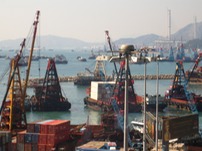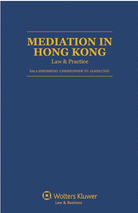Spotlight on Third Party Funding

Laura Lozano, our Spanish face, queries Third Party Funding in her recent post on the Kluwer Arbitration Blog.
Check out Laura’s article which considers some of the issues worthy of consideration,
LCIA cases on the rise
Further to the recent Thoughts from our Spanish Face, Laura Lozano, new statistics reported in the Financial Times reveal that the LCIA has seen a rise in the number of cases heard. For more information about the recent LCIA rule changes please refer to Laura’s article.
Asialaw Dispute Resolution Summit 2014

Our Hong Kong Face, Sala Sihombing will be speaking at the Asialaw Dispute Resolution Summit 2014 in Hong Kong. Sala will join a panel to consider the balancing act that companies must conduct when considering the most appropriate form of dispute resolution.
Laura Lozano on the focus of investor state arbitration

Laura Lozano, our Spanish face, queries the focus of investor state arbitration in her recent post on the Kluwer Arbitration post. Is the focus of investment state arbitration switching from Latin America? If so to where? Click on the link to share Laura’s thoughts.
Finally a mediation book for summer!

Our Hong Kong face, Sala Sihombing co-authored a book on mediation in Hong Kong which has been published just in time for summer holidays. The work is a review of the theory and practice of mediation in Hong Kong.
The book is available in shops or for order online direct from the publisher CCH Wolters Kluwer.

Dispatch inspired by Seoul

Our Korean face, Priscilla sends a dispatch from Seoul. Rows of countless yellow ribbons line the streets in front of Seoul’s city hall as the city mourns the death of 287 plus lives lost in the Sewol ferry disaster. The long ribbons contain written messages to the victims, many expressing their apologies and promises of "never again" and "you will never be forgotten." The yellow ribbon holds various symbolic meaning across the world including forgiveness, solidarity, protest, hope, army troop support, suicide awareness, and higher education. In South Korea, the color yellow also signifies the opposition political party against the current dominant political party, which is represented by the color red. Many Koreans blame the government for the deaths and they demand retribution. In the face of such anger and grief, what is the government to do?
The United States has had its share of tragedies on a national scale. There have been too many school shootings, terrorist attacks, and disasters caused by corporate negligence. In many of these instances, Congress has repeatedly appointed Kenneth Feinberg as an arbitrator to monitor and designate compensation awards to victims' families. Nicknamed the "pay czar" and "Special Master for Compensation," Feinberg has been involved in the Agent Orange product liability litigation, the asbestos personal injury litigation, September 11 Victim Compensation Fund, the Hokie Spirit Memorial Fund (Virginia Tech shooting), the BP oil spill fund, the Penn State settlement (Jerry Sandusky sex abuse scandal), the Aurora victim relief fund, the Boston Marathon Bomb Victims fund, and the Newtown-Sandy Hook Community Foundation. Feinberg's skill lies in the ability to quietly listen to the stories from families, learning early on the importance of allowing grief-stricken families to vent their frustrations and sorrows. He then devises a system that allows him to calculate how much each family should be compensated. Of course, Feinberg has many critics who are unhappy with his methods and there are families who believe they deserve more - he has been openly yelled at during meetings. In his new book, Who Gets What: Fair Compensation After Tragedy and Financial Upheaval, he challenges anyone else to take his job if they think they can do better. He knows that his formula is not perfect and he has made some mistakes, but it is the best anyone has come up with so far.
I met a Korean labor attorney who also attended the Straus Institute for Dispute Resolution at Pepperdine University when I was in South Korea for a business trip. We spoke about the program, what we have been up to since we graduated, and recent disasters such as the Sewol ferry tragedy. Kang Boon Moon has an incredible knack of receiving new concepts and creatively applying it her passion in alternative dispute resolution. I told her about Kenneth Feinberg and his incredibly difficult task of sorting through sorrow and having to put a price on lost lives. Moon absorbed this information and began to think of ways to apply what Kenneth Feinberg has accomplished to the Sewol disaster. She insisted that the time for new turnings in Korea is now. Koreans are focused on victim compensation and the strict enforcement of policies. In a country where presidents and politicians have never apologized for their actions, would a government-appointed arbitrator be accepted by the Korean citizens?
Snap Crackle and Popped : General Mills arbitration submission

Our Hong Kong face, Sala Sihombing writes that after a stunning announcement on 16 April, General Mills in the US has reversed itself within a week. Earlier in the week, General Mills had announced that any customer who participated in any coupon offering or who joined an online campaign or signed up for an email alert were doing more than celebrating their favourite breakfast cereal. As the New York Times reported, General Mills through an online popup was deeming such participation to be acceptance of a new dispute policy which called for arbitration for any disputes. Whilst there has long been controversy about what constitutes appropriate submission to arbitration for consumer contracts, this was a quantum leap in submission strategy. Apparently, it was a leap too far. By 20 April, the New York Times was reporting that General Mills had reversed itself on the basis that their ‘concerns and intentions had been widely misunderstood’. Was such a pop up even enforceable? would it have constituted valid submission? these questions will need to wait a test case, but it seems as if arbitration lawyers will need to consider the validity of how we submit to arbitration in an electronic age.
Hong Kong’s Mediation Week starts today

Our Hong Kong face, Sala Sihombing writes that the Hong Kong Mediation Week organised by the Department of Justice starts today. There are various events being hosted all over Hong Kong to publicise and promote the use of mediation for the full spectrum of disputes. Sala will be attending the Mediation Conference 2014 and will be presenting with the Hong Kong Collaborative Practice Group on Saturday in a very special role-play to encourage the use of collaborative practice for family dispute.
the mediation suite hits Hong Kong

Our Hong Kong face, Sala Sihombing has launched the mediaiton suite in Hong Kong. As she explains in the ADR Times, much thought has gone into designing a space for effective dialogue. As with any renovation there were some ups and downs.
The launch party was held on 20 February and as with any good mediation, there are no records of what was a very good night. The mediation suite is also available for hire for meetings, seminars and mediations in Central, Hong Kong. For more information please check out the website www.conflictchange.com.

Mediation public service announcement by the American Bar Association
Laura Lozano, our Spanish face, suggests watching this American Bar Association public service announcement on mediation to get a fresh perspective.

